ONE CONTINENT
We are more alike than different: Anti-xenophobia exhibition reframes perception of foreigners
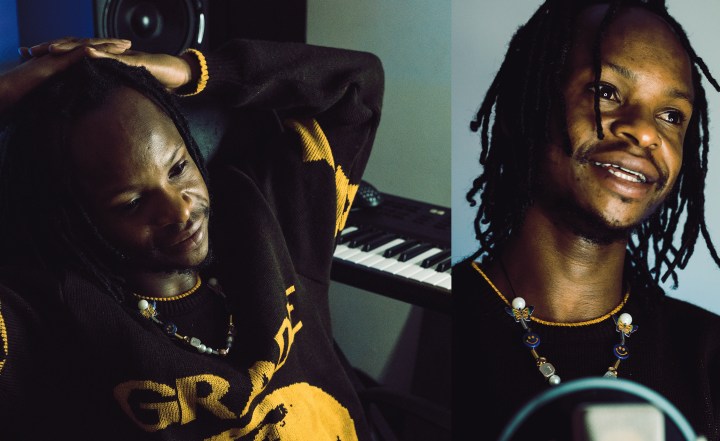
With Operation Dudula gaining traction in Gauteng, xenophobia and violence are once again growing against foreigners, who are often targeted because of the perception that they are ‘stealing’ local jobs. A new exhibition aims to change that perception.
Distance is an exhibition born out of frustration with the current handling of xenophobia in South Africa. What does the government’s “Stop Xenophobia” messaging achieve? Do people stop killing and discriminating because they are told not to?
An exhibition cannot eliminate the material conditions that result in fear over “job theft”, but perhaps it can influence the perceptions that turn that into violence.
Xenophobic hatred is often directed at other black people. Other poor people. Other Africans. What makes fellow Africans the target? Are they not the same people who deliver our goods? Who do our hair? Who make our clothes? People whose music we love? Who employ our family members? So that irony is put on show. To present that so-called “foreigners” give much more than they take. That they create businesses, teach skills, entertain, provide goods and services and so much more.
But is a person’s value found only in what they give to the economy? No. There are stories of uplifting communities, creating art and being enthusiastic members of subcultures. But is a person only valuable for how they touch other lives? No.
Then we arrive at the images. We have smiles, tears, thoughtfulness – a whole spectrum of emotions. We have parts of their everyday in the background. We have colour and candour. People are valuable simply because they are. This is what the exhibition is highlighting – that we are more alike than different. We have a common humanity and a common continent. We are stronger together. That no human being is foreign. That no human being is illegal.
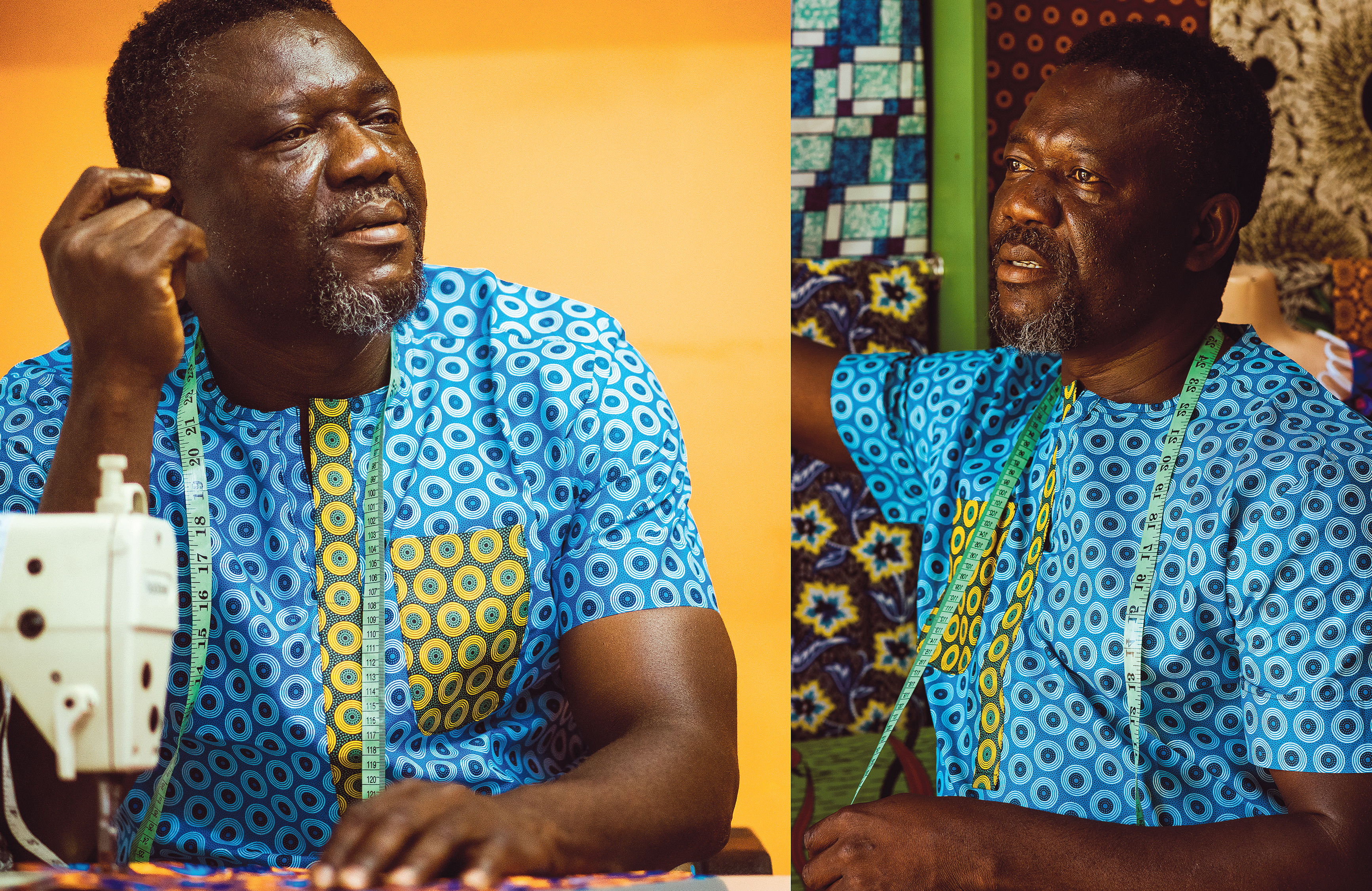
Chinedu Felix Nweke is a Nigerian business owner whose shop provides tailoring and materials. He started his business in 2004 and says he has been received well by locals. (Photo: Shen Scott)
The idea for Distance came to life through the interaction of the exhibitors. I identified the upcoming significance of 22/2/22 and suggested we do an exhibition. Then, on 22 January, I met Tebogo Mogola at a creative meet-up. As we began to connect over similar art and cultural interests, the desire to collaborate grew quickly. We walked away from that conversation having committed to pursuing the idea of what would become Distance.
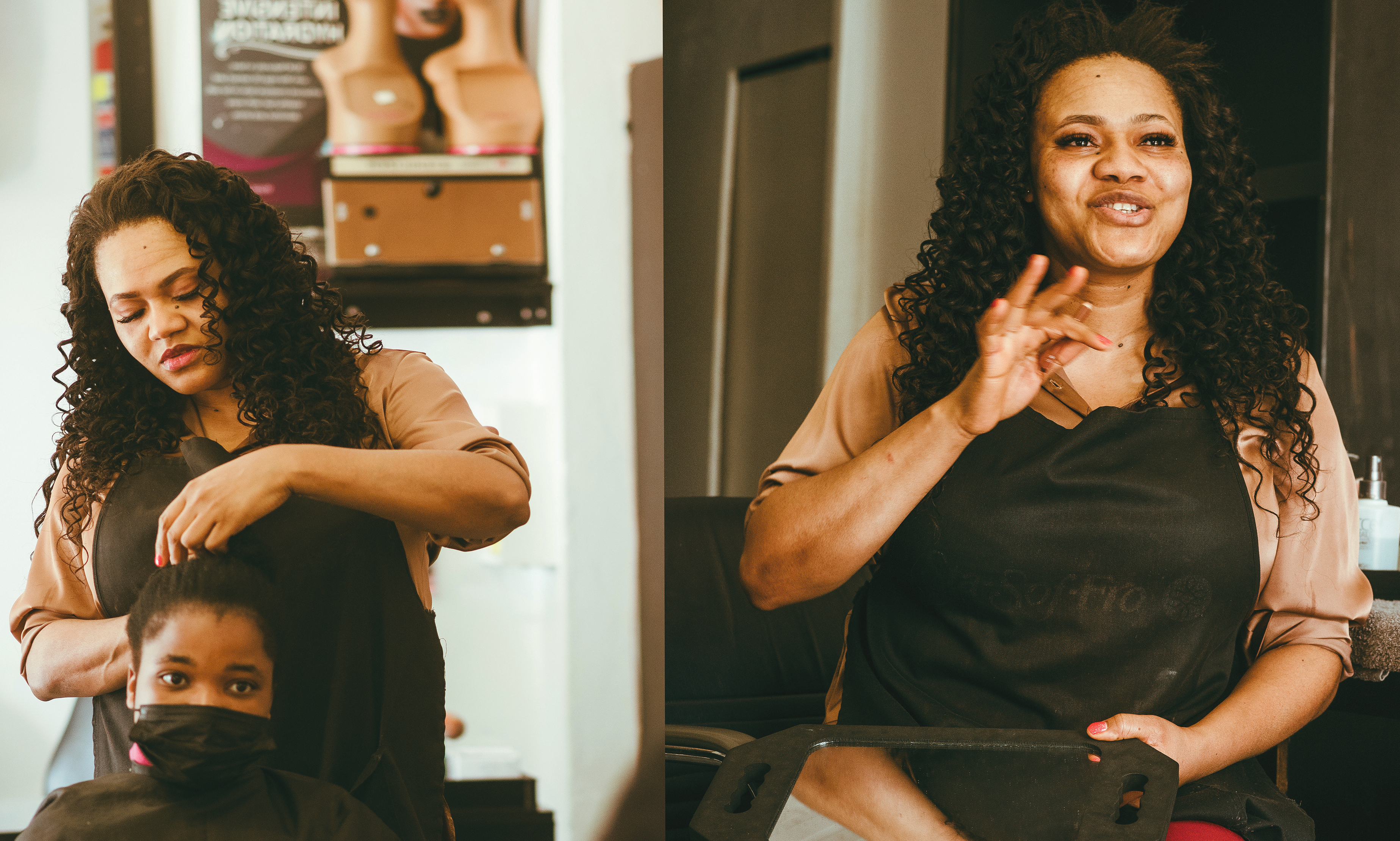
Claire Oluchi Nwokeji is a Nigerian-born accountant who came to South Africa in 2008 to further her education but ended up operating a salon. (Photo: Shen Scott)
Taking every gap we had over the past four weeks, we’ve relentlessly pursued the creation of this project. With Tebogo producing – arranging participants, locations, printing, conducting the interviews and bringing in Grace Moloisi as production manager.
I shot and edited all the images, along with designing the logo, title and some of the promotional material. Shem Chung Tam was working with the floorplan, conceiving the final implementation of the works and sculptures as well as pushing out designs for the window vinyls. Things were moving at an intense pace, but we were on track and keeping up.
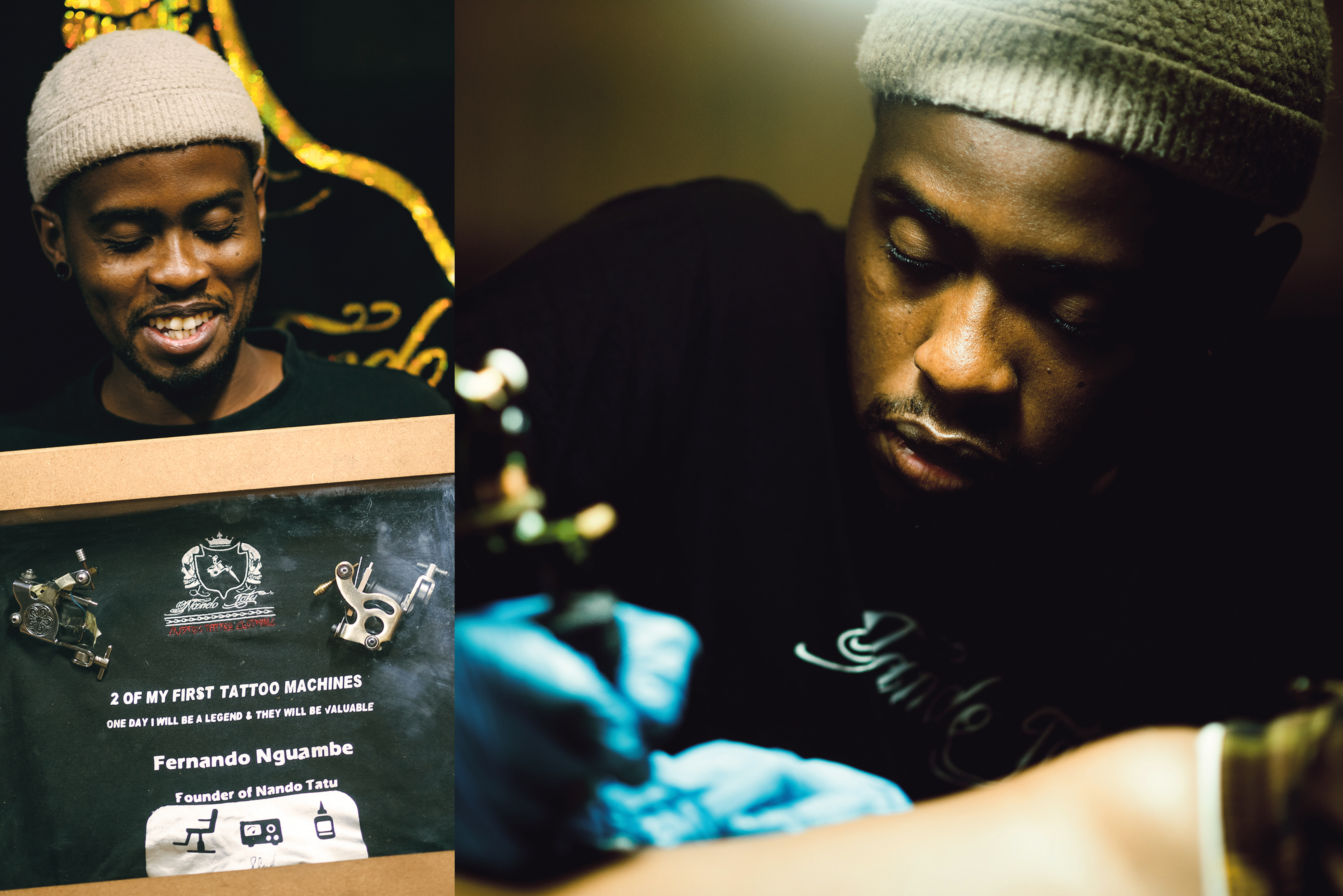
Fernando Nguambe came to South Africa as a child with his parents, who were seeking better opportunities. (Photo: Shen Scott)
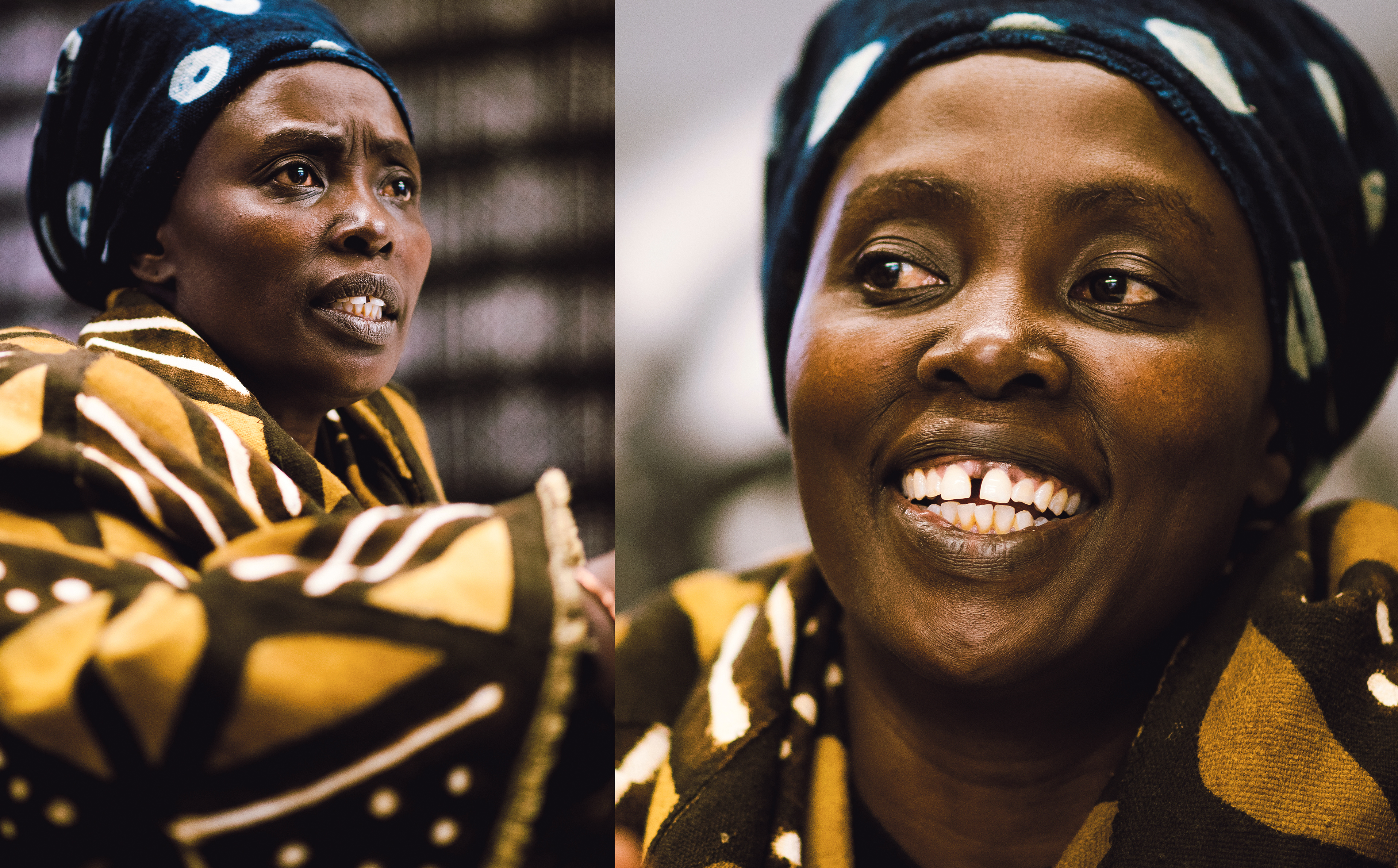
June Omondi is a Kenyan-born crafter who came to trade in South Africa in 2006. She has been a key player in the crafts scene since she arrived. (Photo: Shen Scott)
Then Shem arrived on Saturday morning to a locked venue and was told access would not be possible all weekend. Monday comes and it’s all hands on deck to turn an empty room into an exhibition by the following morning. Holes are drilled, steel is cut, nails are struck and string is strung. The vinyl is being placed after dark and Tebogo is arranging food, drinks, last-minute materials and for works to be reprinted because of defects in several of the prints.
Grace is scrambling behind the scenes to get details for the captions and I’m just doing everything I can, from hanging prints to cleaning the covered windows that have concealed our frenzy from the mall guests. It’s 9pm and we’re asking the cleaning night shift if we can borrow their brooms to clear the last evidence of the process that remains on the floor. It’s 10pm now and we’re proud. It looks good, it flows well, this idea that we had in our heads is now something we are walking through. DM168
Meet the collaborators
The images in this photo essay are part of a creative collaboration and exhibition titled Distance – Connecting Us to Our Common Continent at The Zone in Rosebank, Johannesburg, daily from 9am to 5pm until 16 March.
It was brought to life by the collaboration between:
Tebogo Peter Tariq “Lepito33” Mogola is a South African, born and bred in Mamelodi in Pretoria. For more than a decade, Mogola has worked on the frontlines of African entertainment content and creative production. Highlights include working on the launch and content for Mzansi Magic and Vuzu, and being the creative director for the Channel O Music Video Awards and DStv Viewers Choice Awards.
The Safta-winning creative is the former senior creative manager for Viacom Africa, where he worked with brands such as MTV, MTV Base, BET, Comedy Central and Nickelodeon. He is passionate about collecting sneakers and was co-director of Sneaker Exchange (SXC_ZA). Mogola is a partner at Don’t Look Down Productions.
Shen Scott is a visual communicator who uses photography, design and his hands to tell stories with intention, attention and authenticity. Starting in photojournalism during university covering #FeesMustFall and #AfrikaansMustFall, he has since worked locally for the likes of the Nelson Mandela Foundation, Schindlers, Nedbank, Absa and internationally for UN Women, JAM International (through One Pass Productions) and The Ellen Fund (through HabitatXR). He currently runs creative consultancy Shen Shem with his partner Shem Chung Tam, improving businesses’ effectiveness through media and design solutions.
Shem Chung Tam is a mixed-media visual artist specialising in curating virtual and physical interactive installations. Being born in Hong Kong and educated in South Africa provided him with a unique experience in both art and culture. He graduated from the University of Pretoria as one of the top fine arts students and began his marketing career in creating innovative spaces for international clients such as Sketchers and Gouchi HK; locally for Jenna Clifford, Banchan and The Butcher Shop & Grill. He co-founded Shen Shem with his partner Shen Scott, where together they bring transformative and innovative changes to South African business.
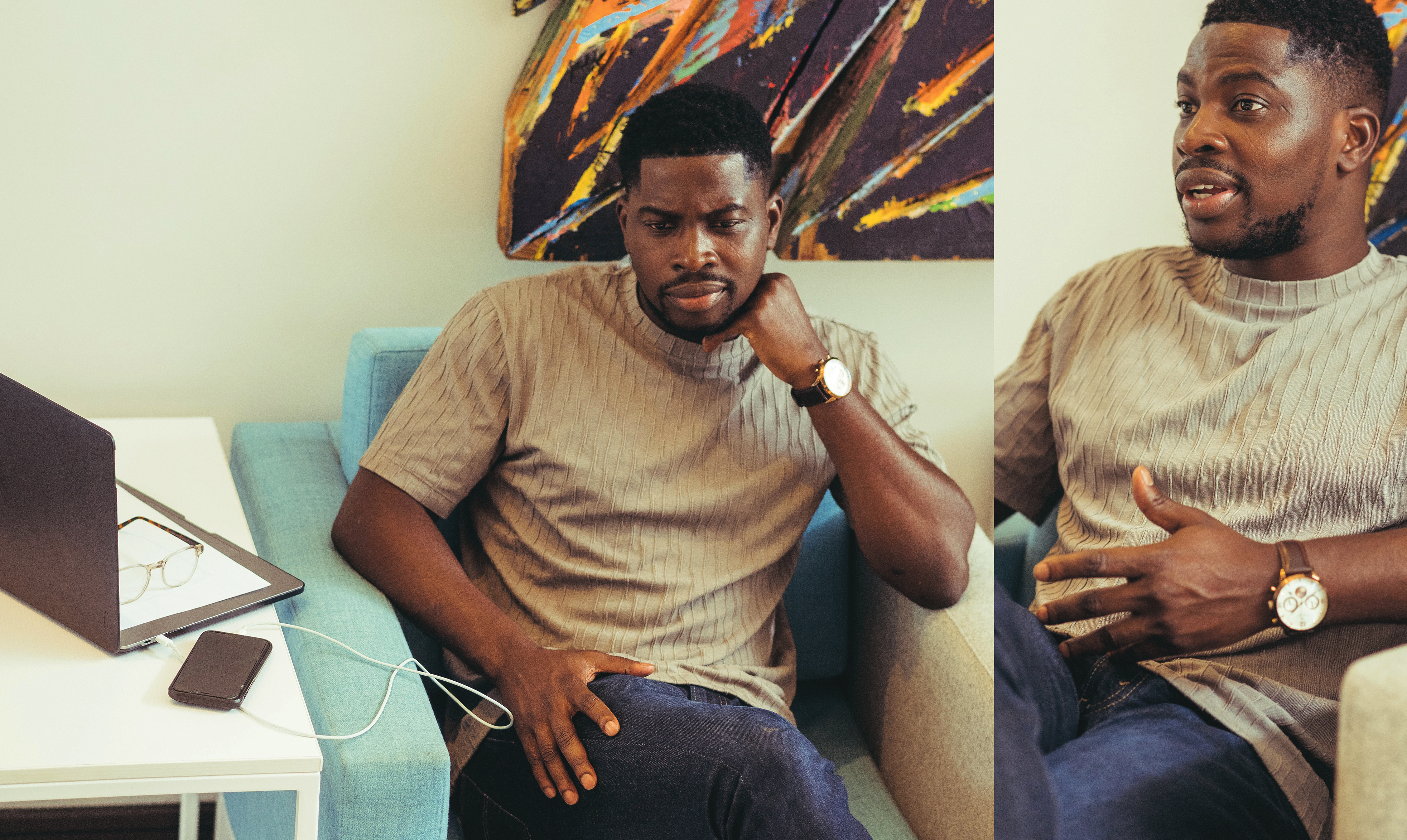
Kola Olajide. (Photo: Shen Scott)
Kola Olajide is a Nigerian-born businessman and CTO of Bridge Labs. He came to South Africa in 2009 to study.
After some impressive projects, Olajide was granted an exceptional skills visa to assist with a project for the Western Cape government. He now employs 20 to 25 people, about 70% of whom are South African.
He believes we need to highlight the positive things foreigners are doing to change how they are seen. “I am a strong believer that Africa can solve its own problems,” he says.
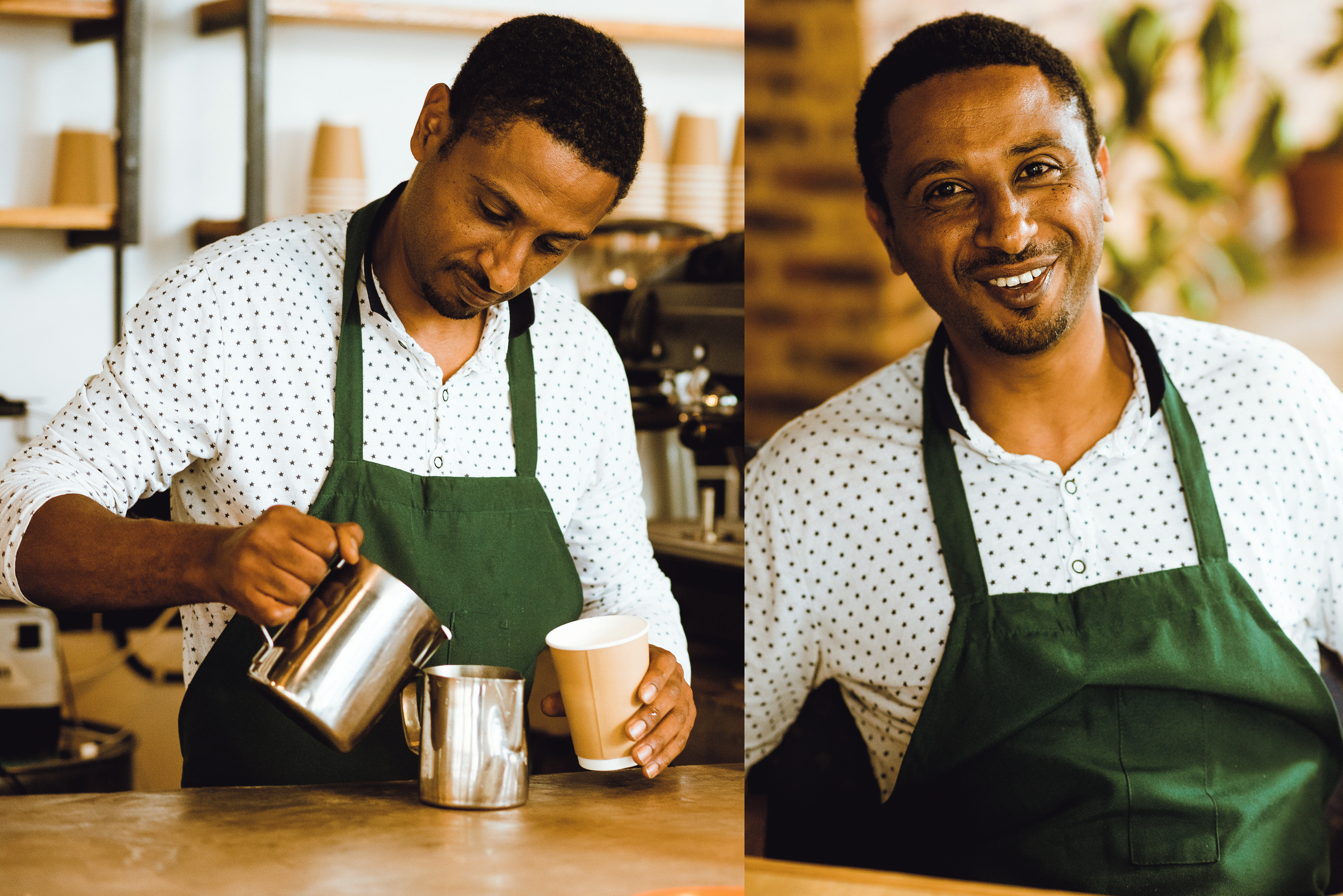
Solomon T Firdie. (Photo: Shen Scott)
Solomon T Firdie is an Ethiopian café owner who arrived in South Africa in 2008. He was able to start the shop and keep it running through lockdown with the support of family back home.
Though he initially heard stories of crime and violence, Firdie has found South Africa to be beautiful, full of positive people and opportunity. When asked to imagine an Africa without borders, Firdie says: “I don’t feel like I’m far from home. This is my home, that’s how I feel.
“It’s not about colour. It’s not about where you from. It’s about who you are individually.”

Fernando Nguambe. (Photo: Shen Scott)
Fernando Nguambe came to South Africa as a child with his parents, who were seeking better opportunities. Unable to afford university and unable to qualify for bursaries as a foreigner, Nguambe worked as a graphic designer and T-shirt printer while saving up to pursue a dream of becoming a tattoo artist. Earning R500 a week and spending almost R300 of that on transport, it took him several years to change careers and open his own shop.
Nguambe believes ignorance is the source of xenophobic hatred and, “if we kill ignorance, we can have that one Africa that we all want”.
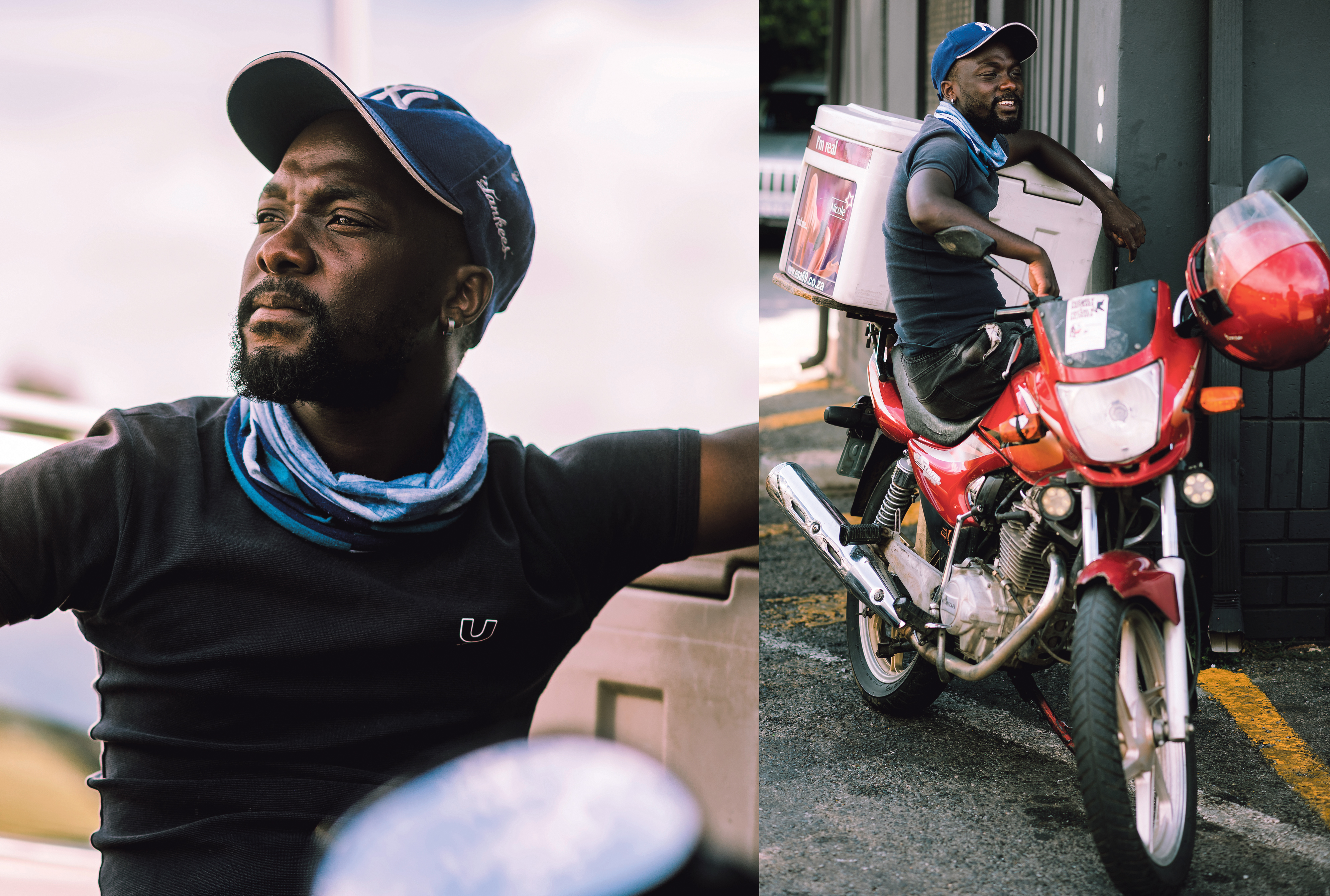
Larry Mafu. (Photo: Shen Scott)
Larry Mafu came alone to South Africa in 2019 “just to survive”. In Zimbabwe, he struggled with poverty while training to be a soccer player. Doing Uber deliveries, Mafu says he loves his life here, is able to send money home and also travel back to visit his family. He believes that a “spirit of working”, together with a South African ID, can result in finding work.
“No one can take someone’s job. But if you have a spirit to work you can find a job. There are many jobs here in South Africa that you can look for.”

Claire Oluchi Nwokeji. (Photo: Shen Scott)
Claire Oluchi Nwokeji is a Nigerian-born accountant who came to South Africa in 2008 to further her education but ended up operating a salon.
Her perception of the country was defined by the TV show Special Assignment, which gave her the impression that life in South Africa was like “a war zone”.
She believes that it is important to engage with each other: learn each other’s language, eat each other’s food and respect each other’s laws. “We just need to evolve and respect each other’s space. If we are able to do that, Africa would be the best.”
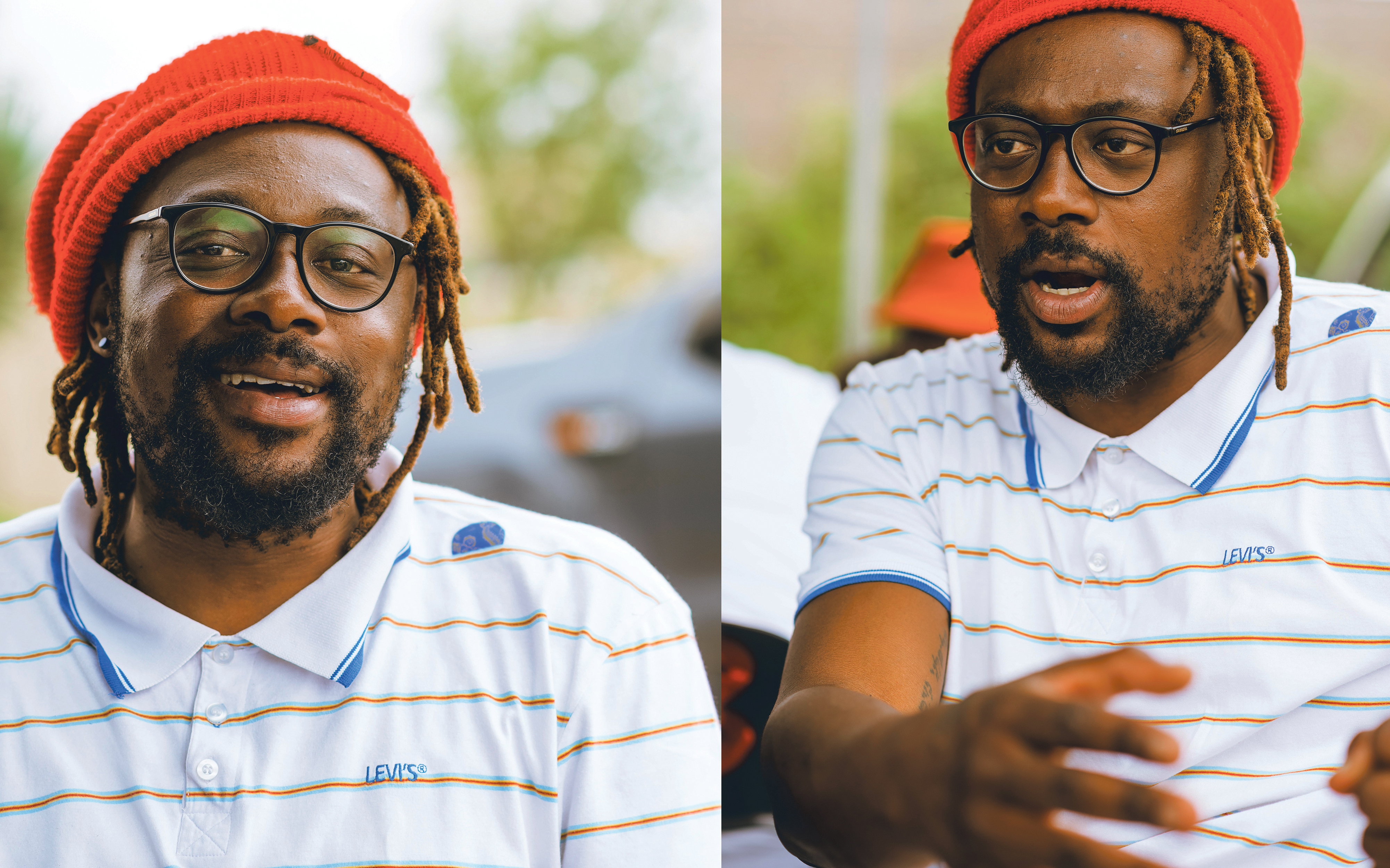
Richard Lukunku. (Photo: Shen Scott)
Richard Lukunku is a Congolese-born actor, writer and director. He came to South Africa in 1996, when he was three, knowing nothing about the country but what he had seen on a few postcards from his father.
He believes that a path to unity starts with self-love. “If I love myself, I cannot want bad for you.”

Chinedu Felix Nweke. (Photo: Shen Scott)
Chinedu Felix Nweke is a Nigerian business owner whose shop provides tailoring and materials. He started his business in 2004 and says he has been received well by locals.
Nweke believes that opportunities can be created by starting businesses rather than seeking jobs, and he has trained locals and migrants alike in tailoring. He also encouraged his South African wife to start a business. He believes the problem lies in young people not knowing what to do and that the government needs to start from grassroots and empower young people. “We are all one people. An Africa united is free.”
June Omondi is a Kenyan-born crafter who came to trade in South Africa in 2006. She has been a key player in the crafts scene since she arrived – from selling wholesale to Lebo Malepa after meeting him in the market outside the Hector Peterson Museum to selling at the Newtown Market, the Rosebank Market and now at Market on Main in Maboneng.
Omondi believes there was more unity in the early years and that the government needs to create structures for artists to create, trade and form community – no matter their background. “People are not educated about foreigners and their cultural variety.”

Kim Jayde. (Photo: Shen Scott)
Kim Jayde is a Zimbabwean-born TV presenter and the founder of KJ Productions. She came to South Africa 12 years ago to get her honours degree in social work and psychology. Jayde believes that South Africans’ perceptions of a “foreigner” need to change as we have so much in common with the rest of the continent.
“By breaking down those barriers, we’re allowing the next generation to feel less alone. For their journeys to be a little bit easier. For them to not find their countrymen trending on Twitter and being murdered just because of where they were born. Just because they want to have a better life, and do it in a legal way. I don’t think you should die because you want to be able to get an education or you want to be able to send money back home. That just doesn’t feel right.”
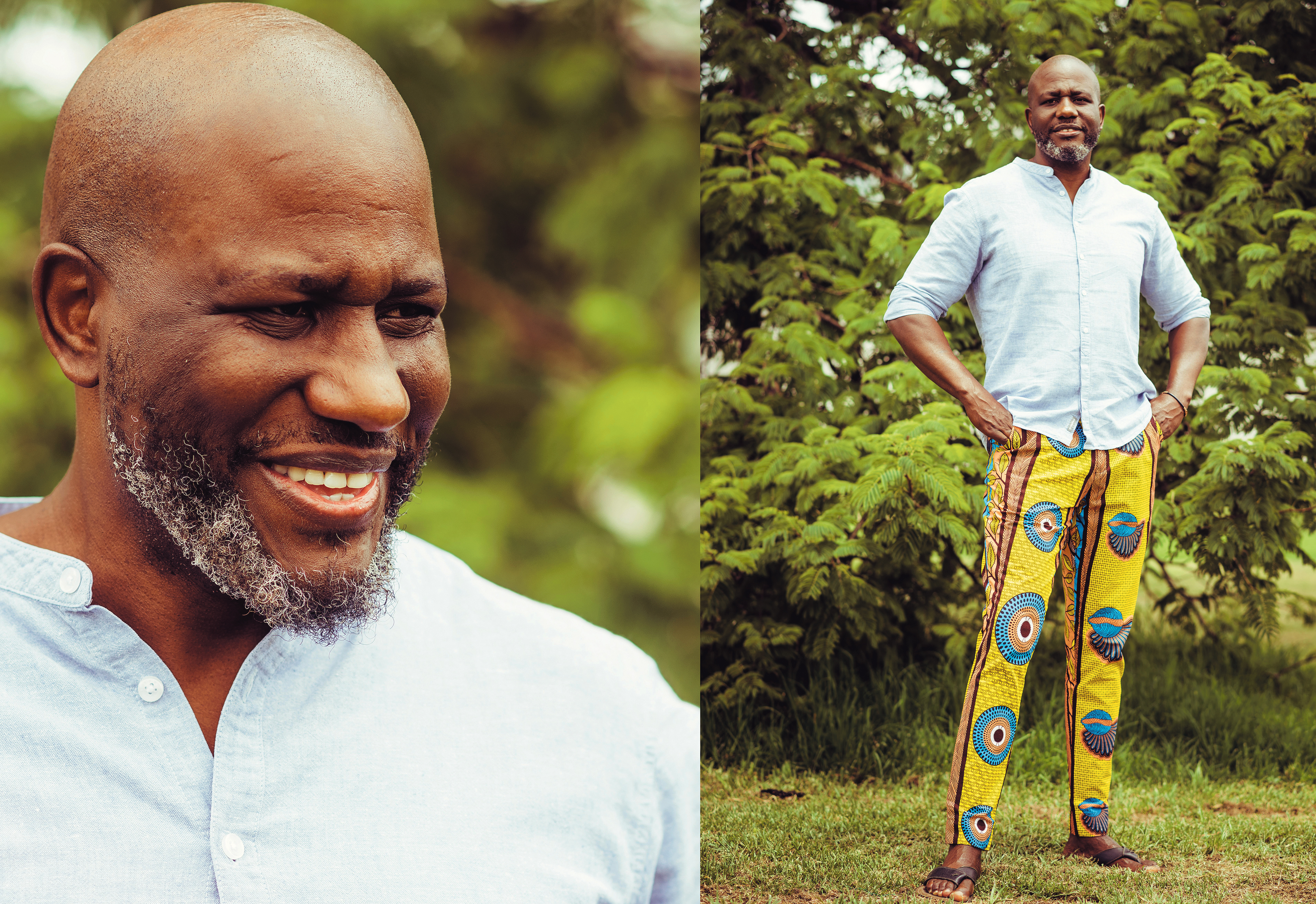
Raphael Benza. (Photo: Shen Scott)
Raphael Benza is a Liberian-born and New York-raised artist manager and chief opportunity creator at Vth Season. He came to South Africa in 2001, seeking to explore the local hip-hop and music scene based on what he was hearing in Brooklyn.
Benza believes education is the solution – by showing how other parts of Africa live and function, we can reduce ignorance and change perceptions about foreigners. “The education needs to change; the media needs to help. Talk about our history, focus more on what unites us than what separates us.”
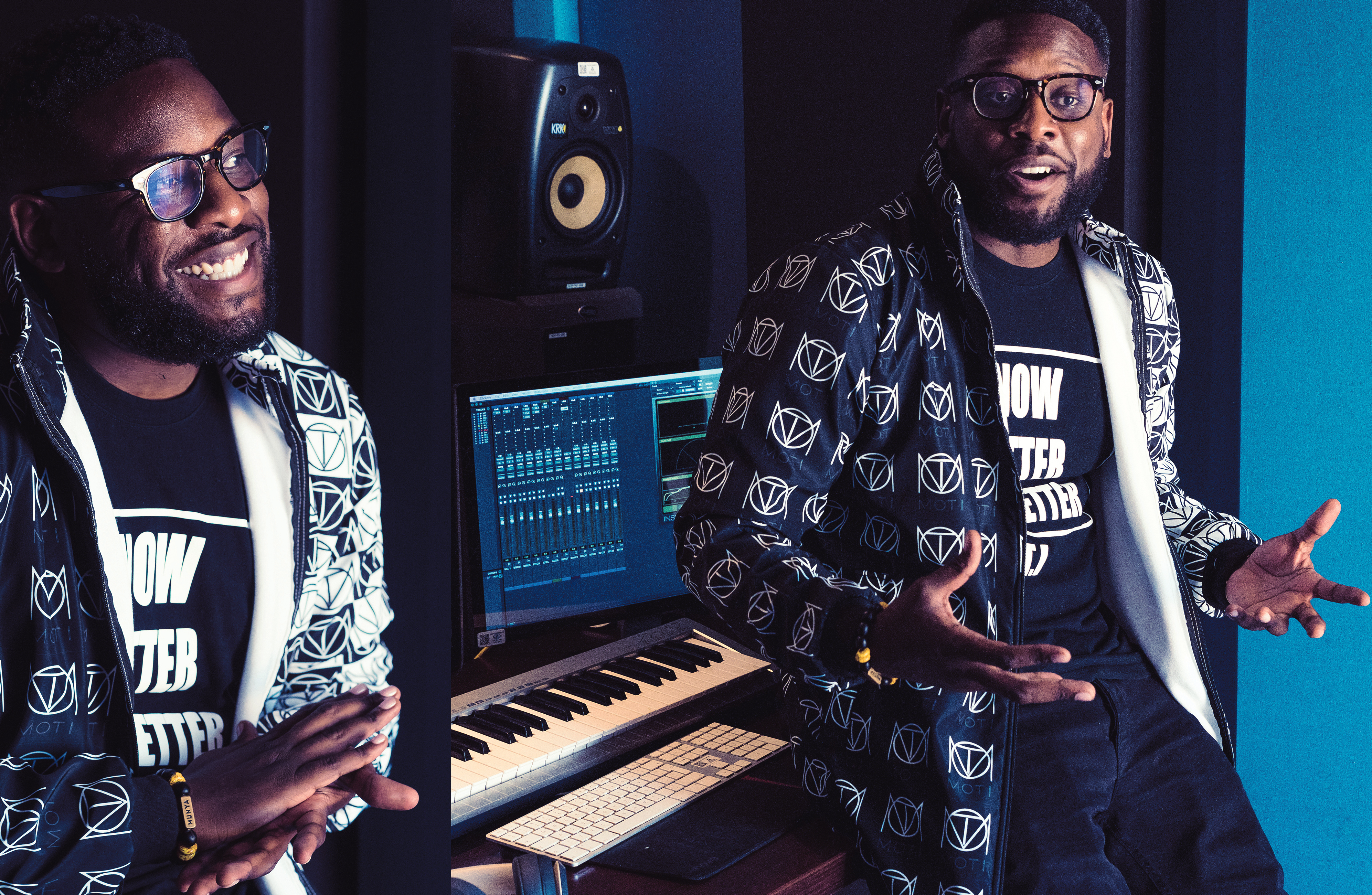
Munyaradzi Hamandishe and Yemurai Thomas Chanetsa. (Photo: Shen Scott)
Munyaradzi Hamandishe Yemurai Thomas Chanetsa came to Chanetsa’s mother’s home country South Africa from Zimbabwe in 2007 to get a tertiary education. He now leads A&R (artists and repertoire) for Sony Music Africa and believes that exposure through travel changes the way people see the world.
“Travelling exposes you to other cultures, it exposes you to other people. And not only does it expose you to that, but it almost makes you more understanding or accepting because you realise that what’s in front of you or where you live isn’t the whole world.”
Benn Gilbert Kamoto aka Gemini Major is a Malawian-born producer and singer-songwriter. He came to South Africa in 2008 after growing up consuming South African culture and music such as Mafikizolo.
Kamoto speaks of times when xenophobic attacks had him fearing for his life. “I was scared to death. For a whole week, I just stayed at the house.” He also sees travel as necessary to improve sentiment about migrants. “If we travel, we will be well informed and it will help with empathy.”

Miguel Mabica. (Photo: Shen Scott)
Miguel Mabica is a professional e-sports player and Ultimate Gaming Championship winner. He came to South Africa from Mozambique to study in 2018 after being told by his brother that South Africa was the closest place to get a higher-quality education.
Mabica says he didn’t really know about the problem of xenophobia before coming here, but has personally been embraced by locals through the gaming community.
When xenophobic attacks are in the news, Mabica gets calls from his parents to check if he’s okay. While he’s grateful that they care, he wishes it wasn’t something they had to worry about. “We are all the same, just part of different places. It shouldn’t be that hard to accept people.” DM168
This story first appeared in our weekly Daily Maverick 168 newspaper which is available for R25 at Pick n Pay, Exclusive Books and airport bookstores. For your nearest stockist, please click here.
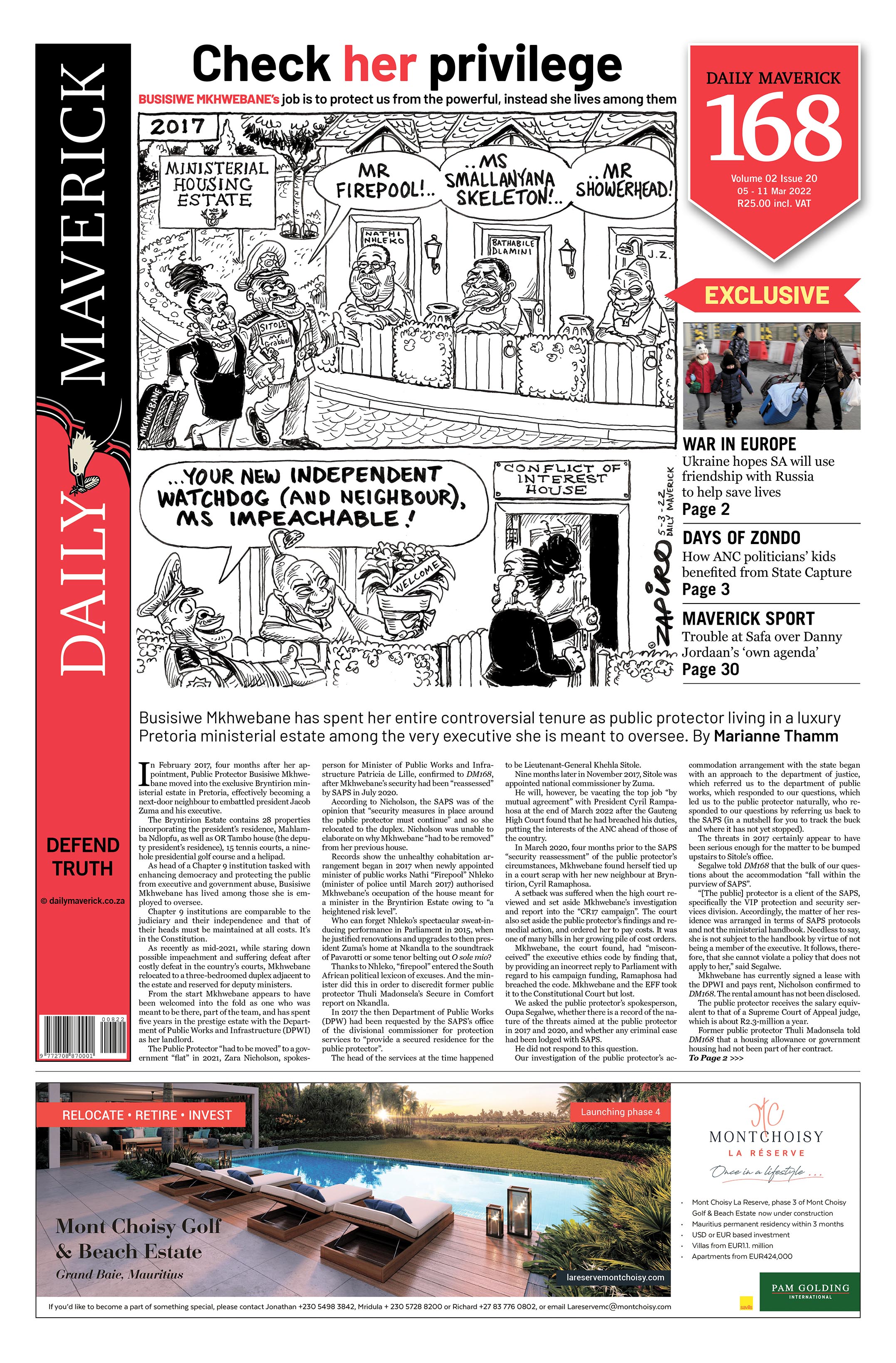

















 Become an Insider
Become an Insider
Comments - Please login in order to comment.